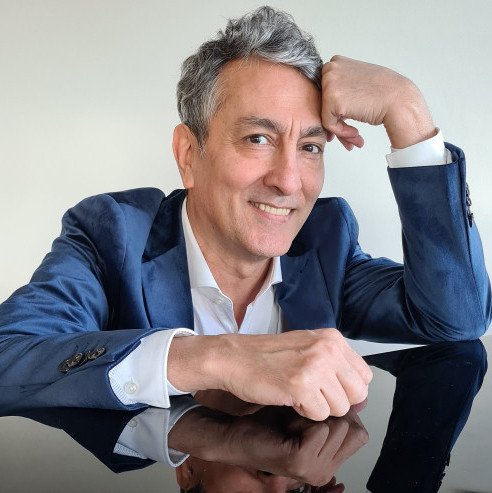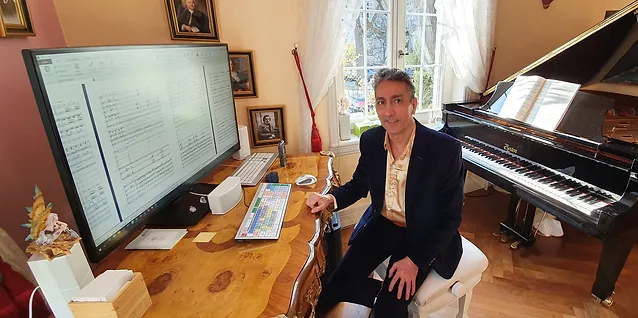Saeed Habibzadeh is an incredibly talented musician. He is a music producer as well as a composer for film and classical music, with a diverse body of work that includes pop, rock, country, EDM, jazz, etc. He is creating unique music that has the power to directly touch the listener’s heart and transport them to a realm beyond sound. Check out the exclusive interview below:

1. Can you tell us a bit about where you come from and how it all got started?
SAEED HABIBZADEH: I was born in Tehran, the capital of Iran, but I have lived in Germany almost all my life. I have composed many pieces of music which I have played on the piano and recorded. But it wasn’t until the summer of 2019 that I started notating and orchestrating them professionally. In 2021 my friends and I decided to leave Germany to live and work in Switzerland. In November 2022, we founded the band Avalight and released our first single Follow the Christmas Light. In March 2023 I released my first film music album Lost Men.
2. Did you have any formal training or are you self-taught?
SAEED HABIBZADEH: Everything I know I taught myself or I brought it along from other incarnations. I’ve never had music lessons, nor have I studied it. Thinking about my first composition, the Spartacus Symphony, I still cannot realize that I composed, notated and orchestrated a symphonic poem lasting 55 minutes for a large orchestra and choir with absolutely no education, study or experience. The Spartacus Symphony score was published in April 2023.
3. Who were your first and strongest musical influences and why the name ‘SAEED HABIBZADEH’?
SAEED HABIBZADEH: My first contact with classical music was at the age of 9 with Beethoven’s Symphony No. 5. However, Bach, Mozart, Chopin, Tchaikovsky and Shostakovich were the ones who had the greatest effect on me. My first name means “the one blessed by God, meant to spread happiness, laughter and wisdom”. My family name consists of “Habib” and “Zadeh”. Habib is a love call to God and Zadeh means “born of”. So, Saeed Habibzadeh means “born of God who brings laughter, bliss and wisdom to earth”.
4. For most artists, originality is first preceded by a phase of learning and, often, emulating others. What was this like for you? How would you describe your own development as an artist and music maker, and the transition towards your own style, which is known as CLASSICAL?
SAEED HABIBZADEH: I believe that a true artist does not need to emulate others. His style develops on its own. I have no power over my music. It guides me through every composition. Each time it is a new and unique experience with new ideas, paths and implementations. I can’t see any specific musical direction in myself. I compose classical works, pop, love songs, musicals and film music. Maybe it’s better that way. When a composer has a certain style, it can happen that he gets caught up in it and loses his musical artistic freedom.

5. What has been the most difficult thing you’ve had to endure in your life or music career so far?
SAEED HABIBZADEH:
The worst thing for me was and is to endure the feelings and images that I translate into musical language. For example, I went through hell composing, instrumenting and orchestrating Lost Men. This music triggered tears, heart palpitations, very intense feelings and excitement in me. It was strongest with the song Wait for me at home!
6. Do you feel that your music is giving you back just as much fulfillment as the amount of work you are putting into it or are you expecting something more, or different in the future?
SAEED HABIBZADEH:
For me there are two questions that I would like to answer with a smile in the last hour of my life. 1- What am I leaving behind in the world? 2- What do I take with me? It fills me with joy when I make music, when I create something that didn’t exist before, something good that many can benefit from. I do that with my books too. The first five are already published.
7. Could you describe your creative processes? How do usually start, and go about shaping ideas into a completed song? Do you usually start with a tune, a beat, or a narrative in your head? And do you collaborate with others in this process?
SAEED HABIBZADEH:
First comes an inspiration that I can’t define. Then I run to the piano and try to translate it into sounds. If it sounds good, I’ll record it. Later, the music itself decides in which form and implementation it wants to be structured. Then it’s notated in the computer either as a classical work for an orchestra, or it’s implemented in our DAW as a pop song, film music and the like. There are thousands of recordings that I hope to edit and publish in this incarnation.
8. What’s your view on the role and function of music as political, cultural, spiritual, and/or social vehicles – and do you try and affront any of these themes in your work, or are you purely interested in music as an expression of technical artistry, personal narrative, and entertainment?
SAEED HABIBZADEH: For me, the essence of everything that makes sense is love. Nothing makes sense without love. It makes sense when we do something with love and out of love. Everything else are human philosophies that don’t have much to do with real life.
9. On the contrary, what would you consider a successful, proud or significant point in your life or music career so far?
SAEED HABIBZADEH: I’ve had a terrible life full of suffering, sorrow, loneliness and brutal experiences. When I look back and realize what I’ve made of myself and my life, it makes me very happy for who I am and the impact I and my work have on millions of people around the world. The word “pride” doesn’t really exist in my context. I prefer to call it joy and bliss. I am happy with what I have made of the time, gifts and experiences so far. Thinking about my future projects makes me even happier and I laugh like a child!
10. With social media having a heavy impact on our lives and the music business in general, how do you handle criticism, haters, and/or naysayers in general? Is it something you pay attention to, or simply ignore?
SAEED HABIBZADEH: The opinion of others is only important if it is objective. Most criticisms, whether positive or negative, are not objective and cannot be argued. Such are rather emotional and testify to personal problems of the critic. A true artist basically has two options: either he follows the generally accepted opinions and makes himself a prostitute of the public or he follows his own heart and feelings. In my case I have decided to follow my music in the heart. It’s still a source of joy when my music uplifts people and reminds them of their feelings and true nature. We desperately need a world of love, peace, respect and mutual support.
11. Creative work in a studio or home environment, or interaction with a live audience? Which of these two options excites you most, and why?
SAEED HABIBZADEH: Every musical form has its own laws and complexity. Since my music is alive, the implementation is also alive. Nevertheless, a direct connection with the audience in a live concert cannot be compared to anything. Because it only happens once and is stored in infinity. Such moments I call moments of infinity.
12. Do you think is it important for fans of your music to understand the real story and message driving each of your songs, or do you think everyone should be free to interpret your songs in their own personal way?
SAEED HABIBZADEH: We can only develop in freedom. I like to explain the background, my thoughts, images and feelings that led me to the respective composition. I also let the listeners recognize their own feelings that the music triggers in them. It is very interesting for me to compare my and their world of feelings, images and stories. Because I compose my music not only for myself, but for the whole world. I think everyone who loves music has enough stories, memories, feelings and dreams of their own that they connect to the music.
KEEP IN TOUCH:
SPOTIFY | WEBSITE | YOUTUBE

